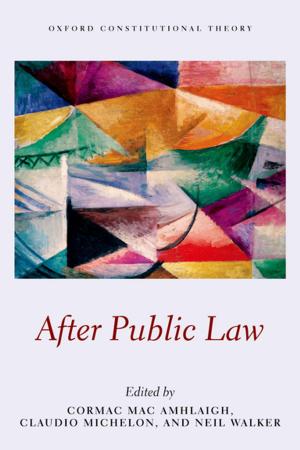We Want What's Ours
Learning from South Africa's Land Restitution Program
Nonfiction, Reference & Language, Law, International, Social & Cultural Studies, Political Science| Author: | Bernadette Atuahene | ISBN: | 9780191024054 |
| Publisher: | OUP Oxford | Publication: | June 26, 2014 |
| Imprint: | OUP Oxford | Language: | English |
| Author: | Bernadette Atuahene |
| ISBN: | 9780191024054 |
| Publisher: | OUP Oxford |
| Publication: | June 26, 2014 |
| Imprint: | OUP Oxford |
| Language: | English |
Millions of people all over the world have been displaced from their homes and property. Dispossessed individuals and communities often lose more than the physical structures they live in and their material belongings, they are also denied their dignity. These are dignity takings, and land dispossessions occurring in South Africa during colonialism and apartheid are quintessential examples. There have been numerous examples of dignity takings throughout the world, but South Africa stands apart because of its unique remedial efforts. The nation has attempted to move beyond the more common step of providing reparations (compensation for physical losses) to instead facilitating dignity restoration, which is a comprehensive remedy that seeks to restore property while also confronting the underlying dehumanization, infantilization, and political exclusion that enabled the injustice. Dignity restoration is the fusion of reparations with restorative justice. In We Want Whats Ours, Bernadette Atuahenes detailed research and interviews with over one hundred and fifty South Africans who participated in the nations land restitution program provide a snapshot of South Africas successes and failures in achieving dignity restoration. We Want What's Ours is globally relevant because dignity takings have happened all around the world and throughout history: the Nazi confiscation of property from Jews during World War II; the Hutu taking of property from Tutsis during the Rwandan genocide; the widespread commandeering of native peoples property across the globe; and Saddam Husseins seizing of property from the Kurds and others in Iraq are but a few examples. When people are deprived of their property and dignity in years to come, the lessons learned in South Africa can help governments, policy makers, scholars, and international institutions make the transition from reparations to the more robust project of dignity restoration.
Millions of people all over the world have been displaced from their homes and property. Dispossessed individuals and communities often lose more than the physical structures they live in and their material belongings, they are also denied their dignity. These are dignity takings, and land dispossessions occurring in South Africa during colonialism and apartheid are quintessential examples. There have been numerous examples of dignity takings throughout the world, but South Africa stands apart because of its unique remedial efforts. The nation has attempted to move beyond the more common step of providing reparations (compensation for physical losses) to instead facilitating dignity restoration, which is a comprehensive remedy that seeks to restore property while also confronting the underlying dehumanization, infantilization, and political exclusion that enabled the injustice. Dignity restoration is the fusion of reparations with restorative justice. In We Want Whats Ours, Bernadette Atuahenes detailed research and interviews with over one hundred and fifty South Africans who participated in the nations land restitution program provide a snapshot of South Africas successes and failures in achieving dignity restoration. We Want What's Ours is globally relevant because dignity takings have happened all around the world and throughout history: the Nazi confiscation of property from Jews during World War II; the Hutu taking of property from Tutsis during the Rwandan genocide; the widespread commandeering of native peoples property across the globe; and Saddam Husseins seizing of property from the Kurds and others in Iraq are but a few examples. When people are deprived of their property and dignity in years to come, the lessons learned in South Africa can help governments, policy makers, scholars, and international institutions make the transition from reparations to the more robust project of dignity restoration.















